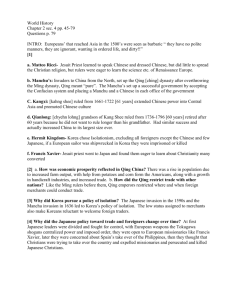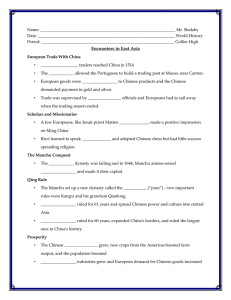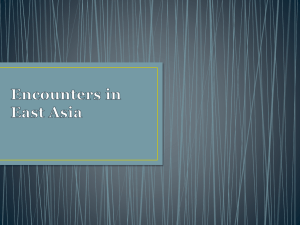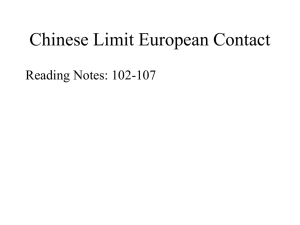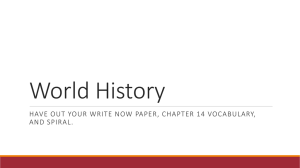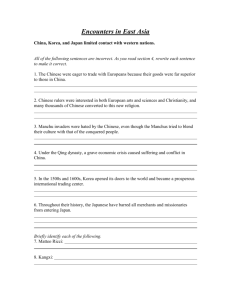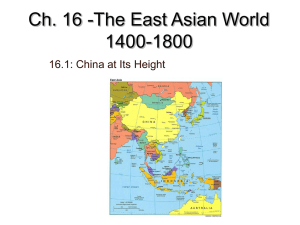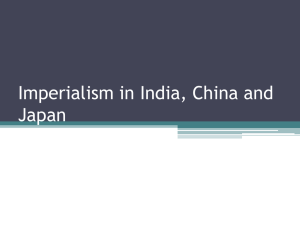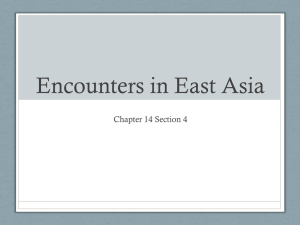Encounters in East Asia
advertisement
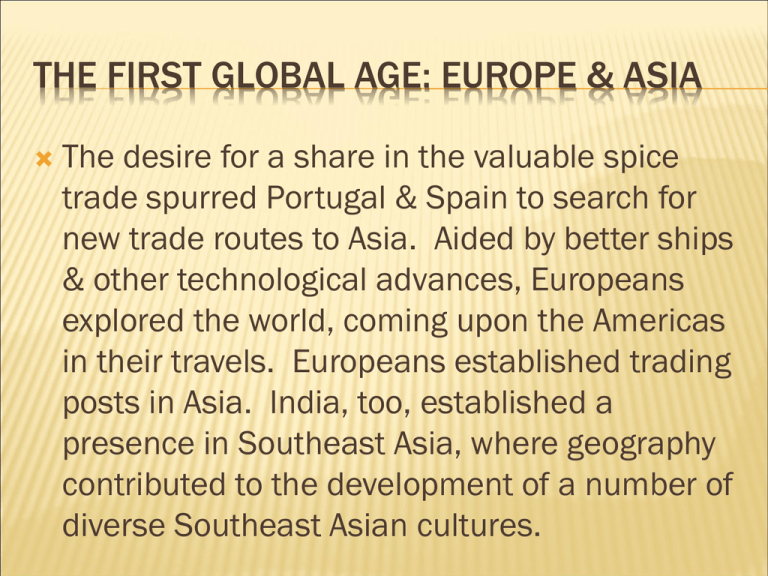
THE FIRST GLOBAL AGE: EUROPE & ASIA The desire for a share in the valuable spice trade spurred Portugal & Spain to search for new trade routes to Asia. Aided by better ships & other technological advances, Europeans explored the world, coming upon the Americas in their travels. Europeans established trading posts in Asia. India, too, established a presence in Southeast Asia, where geography contributed to the development of a number of diverse Southeast Asian cultures. Exploration Unit: ENCOUNTERS IN EAST ASIA WARM-UP The terms isolation, Hermit Kingdom, & closing the door pertain to East Asia between the 1500s & 1700s. What might these terms indicate about East Asian foreign policy during this period? ANSWER TO THE WARM-UP After the Ming dynasty, the Qing (ching) dynasty brought some changes to China. However, both dynasties limited contact with the West. Korea, stung by Japanese & Manchu invasions, isolated itself & became known as the Hermit Kingdom. ANSWER TO THE WARM-UP (CONT.) In Japan, the Tokugawa shoguns first welcomed foreign merchants but then barred them from the country. What does it all mean? In short, China, Korea, & Japan limited contact with western nations between the 1500s & 1700s. SETTING THE SCENE Europeans who reached Asia in the 1500s often made poor impressions on locals. Asians thought that Europeans were… Ignorant Wanting in ordered life Very dirty Had no manners Europeans, however, were impressed with who & what they found in East Asia. EUROPEAN TRADE WITH CHINA “Since our empire owns the world, there is no country on this or the other sides of the seas which does not submit to us.”-document from the Ming Dynasty Ming Dynasty ended overseas exploration in mid-1400s EUROPEAN TRADE WITH CHINA Portuguese reached China by sea in 1514 To the Chinese, they had little to offer in exchange for silks & porcelains European textiles & metalwork were inferior to Chinese products Therefore, the Chinese demanded gold or silver EUROPEAN TRADE WITH CHINA Strict Limits on Trade Eventually the Ming opened a trading post at Macao where Portuguese, Dutch, English & other Europeans could trade w/ Chinese merchants, but under strict limits. For example… trade could only be conducted under the supervision of imperial officials once trading season ended, they had to sail away MACAO EUROPEAN SCHOLARS & MISSIONARIES A few European scholars, like Jesuit priest Matteo Ricci, did make a positive impression on Ming China. 1580s, Ricci learned to speak Chinese & adopted Chinese dress. Ricci & other priests had little success spreading their religious beliefs But Chinese rulers welcomed the chance to learn the arts & sciences of Renaissance Europe. THE MANCHU CONQUEST By the early 1600s, the Ming dynasty was decaying. Revolts erupted & Manchu invaders from the north pushed through the Great Wall. In 1644, victorious Manchu armies seized Beijing & made it their capital. QING (CHING) RULE The Manchu set up a new dynastyQing Manchu barred intermarriage between Manchus & Chinese Manchu women were forbidden to follow the traditional Chinese practice of foot binding FOOT BINDING FOOT BINDING FOOT BINDING FOOT BINDING FOOT BINDING QING RULE For each top government position, the Qing chose two people, one Manchu & one Chinese. Manchu troops stationed across the empire ensured loyalty. Two rulers Kangxi (kahng shee) 1661-1722, extended Chinese power into Central Asia & promoted Chinese culture Qianlong (chyehn lohng) 1736-1796, expanded the Chinese borders PROSPERITY UNDER QING DYNASTY The Chinese economy expanded under both emperors. New crops from the Americas, such as potatoes & corn, boosted farm output, which in turn contributed to a population boom. Population rose from 140 million in 1740 t0 over 300 million by 1800. Further growth in handicraft industries, including silk, porcelain, & cotton. QING DYNATY’S RESPONSE TO WESTERNERS The Qing maintained the Ming policy of restricting foreign trade. Still, Europeans kept pressing to expand trade 1793, Lord Macartney arrived in China as part of a British diplomatic mission. LORD MACARTNEY’S VISIT TO CHINA Brought samples of British-made goods, which the Chinese thought were gifts offered as tribute to the emperor Took offense because they were cheap, crude products. When Macartney met with the emperor, he refused to perform the traditional kowtow, touching his head to the ground to show respect. Spoke of the superiority of the English Do you think the Chinese liked him? NO!!!!!! KOREA & ISOLATION Like China, Korea restricted outside contacts in the 1500s & 1600s. The Choson dynasty embraced Confucian ideas. Like the Chinese, Koreans felt that Confucian learning was the most advanced in the world. The low status of merchants in Confucianism led Koreans to look down on foreign traders. WHAT IS CONFUCIANISM? Ethical & philosophical system developed from the teachings of the Chinese philosopher Confucius. It is a complex system of moral, social, political, philosophical, & quasi-religious thought that has had tremendous influence on the culture & history of East Asia. KOREA & ISOLATION Other events led Korea to turn inward… A Japanese invasion in the 1590s devastated the land of Korea. In 1636, before overrunning Ming China, the Manchus conquered Korea. In response to all of this, Koreans chose isolation, excluding all foreigners except the Chinese & a few Japanese. When European sailors shipwrecked on Korean shores, they were imprisoned or killed. JAPAN & FOREIGN TRADERS Unlike the Chinese or Koreans, the Japanese at first welcomed western traders. 1543, Portuguese reached Japan; later the Spanish, Dutch, & English. They arrived at a turbulent time when there was a struggle for power. The Japanese quickly acquired western firearms & built castles modeled on European designs. JAPAN & FOREIGN TRADERS Japan was much more open to European missionaries than China. Jesuits, like Spanish priest Francis Xavier, found the Japanese curious & eager to learn about Christianity. The Tokugawa shoguns, however, were increasingly hostile toward foreigners. TOKUGAWA SHOGUNS After learning how Spain had seized the Philippines, they saw Europeans as agents of an invading force. They also disliked competition from Christian missionaries; therefore, they had them expelled & brutally persecuted Japanese Christians, killing many thousand. By 1638, they had barred all western merchants & forbidden Japanese travel abroad. WHAT DO YOU THINK? How might limited contact with the West have both strengthened & weakened the countries of East Asia?
